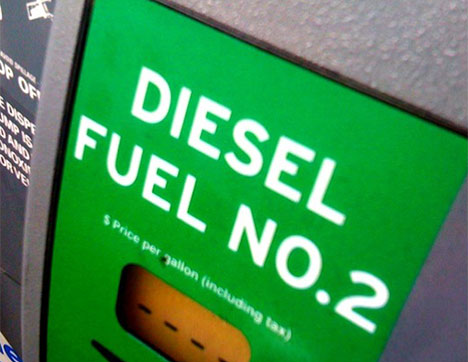Diesels: Codename for Awesome

Admittedly, I am one of the weirdest people ever to make it out of San Francisco alive. My friends are still trying to figure out how I ended up as a right wing conservative, blasting country music in my diesel pickup. I won’t comment about the other things, but I think my choice of transportation is actually perfectly acceptable by environmentalist ideals.
Unlike many who buy trucks, mine wasn’t intended as a grocery getter. In the desert where I work, ditches and unpaved roads can become impassable in cars. I proved this when I sunk my poor ‘07 Accord up to the doors in sand. During the winter, the only road into work floods in several places. Those floods ripped both bumpers off a Mitsubishi Eclipse and pulled an AWD Ford 500 into a ditch. Fact is, I needed a truck. After some researching, it became clear that diesels were the only way to go.
Despite getting a bad rep as loud, smoke producing pieces of turd, modern diesels trump gas engines in areas that consumers truly care about. One of those areas is fuel efficiency. Gas engine trucks achieved dismal numbers – averaging 11-14MPG highway for heavy duty (3/4-1 ton) pickups and 15-18 for ½ tons. I can’t even mention their city MPG without a moment of silence for their owners. Compare this with the 19-20MPG that I routinely achieve in my ¾ ton diesel, or the 20-24MPG that some Dodge Ram ¾-1ton diesel owners are getting.
This trend also prevails in cars – the BMW 335d is 29% more efficient on the highway than the gas powered 335i. Both the Volkswagen Jetta TDI and Mercedes E350 BlueTec get over 35% better highway fuel economy than the gas engine versions. The efficiency gains not only reduce greenhouse gas emissions, but also mean that despite costing more per gallon, diesel costs less per mile. This is a rare case where the environment and your wallet both arrive at the same conclusion.
Owners continue saving money over time by driving their diesels into the ground. I haven’t seen any data on diesel cars, but I know that gas engines are engineered with a mean time between failure (MTBF) of around 150,000-200,000 miles. Diesel engines in pickups today have a MTBF of 350,000 miles. Being able to operate an engine for more miles before rebuilding it or buying a new vehicle not only saves the owner money, but also saves energy and emissions during the manufacturing process. Keeping an old engine running is far cleaner than casting the metal to make a whole new car or engine block.
Reducing emissions and costs is always good, but critics often claim that diesel fuel is hard to find. What they’re really saying is that they didn’t bother looking. While it’s true that not every gas station carries diesel fuel, I have never had an issue finding diesel. Websites like GasBuddy and mobile/GPS apps have made this argument even sillier in recent years. If it worries them that much, then they should just fill up at half tank to ensure that they don’t run out of fuel. I’ve gotten into this habit simply because it prolongs the life of many modern day fuel pumps.
Finally, critics complain that diesels are horrible to live with on a daily basis. They need to understand that new diesels are cleaner, more refined, and more powerful than ever. New diesel engines start right up, even down to 0F. Advanced tuning and emissions equipment allows them to run quietly while preventing any trace of smoke. They also produce twice as much torque at low engine speeds when compared to a similarly sized gas engine. The extra torque makes mincemeat of situations where a gas engine would struggle – passing, hills, and in-town driving.
One area that critics do not often address is initial cost – diesel vehicles are universally more expensive, but it is absolutely worth it. The diesel option on a 2007 Mercedes E-class retailed for $1000 more than an E350 sedan. Today, Kelley Blue Book says it’s worth nearly $5000 more compared to a gas engine model with same the same miles and features. The 2006 Jetta TDI? The $1775 diesel engine option (when new) is currently worth $3475 more than the 2.5L gas engine. The numbers speak for themselves.
The pleasure of driving a diesel powered vehicle can’t be expressed in words, it has to be felt over hundreds of miles and varied terrain. I can’t help but smile when I’m climbing effortlessly up a steep grade in my truck, knowing that the engine isn’t breaking a sweat. I rest easier at night knowing that my truck is saving me money in fuel and in resale value. Considering the refinement, fuel efficiency, longevity, and everyday drivability of diesels, the time has come for Americans to follow the Europeans and adopt this sensible alternative.

